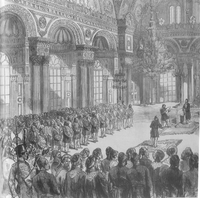- Ottomanism
-
Social structure of the
Ottoman Empire Rise of nationalism · Ottomanism
Rise of nationalism · OttomanismOttomanism (Osmanlılık or Osmanlıcılık) was a concept which developed prior to the First Constitutional Era of the Ottoman Empire. Its proponents believed that it could solve the social issues that the empire was facing. Ottomanism was highly affected by thinkers such as Montesquieu and Rousseau and the French Revolution. It promoted the equality among the millets. The idea originated amongst the Young Ottomans. Put simply, Ottomanism stated that all subjects were equal before the law. The essence of the millet system was not dismantled, but secular organizations and policies were applied. Primary education, conscription, head tax and military service were to be applied to non-Muslims and Muslims alike.
The Hatt-ı Hümayun of 1856 which promised full equality regardless of religion, and the Nationality Law of 1869, which created a common Ottoman citizenship irrespective of religious or ethnic affiliation were precursors to Ottomanism. Ottomanism was rejected by many in the non-Muslim millets and by many Muslims. To the former, it was perceived as a step towards dismantling their traditional privileges. Meanwhile, the Muslims saw it as the elimination of their own superior position. There were claims that Ottomanism was a reaction to the Tanzimat, the era of intensive restructuring of the Ottoman Empire by the bureaucratic elite.
Ottomanism enjoyed a revival during the Young Turk Revolution of 1908, and during the Second Constitutional Era. It lost most of its adherents during the First Balkan War of 1912-1913.
See also
References
- The concept is covered under the section The era of Modern Reform:Tanzimat at "History of the Ottoman Empire and Modern Turkey" by Stanford J. Shaw, Ezel Kural Shaw.
Categories:- Political movements of the Ottoman Empire
Wikimedia Foundation. 2010.

